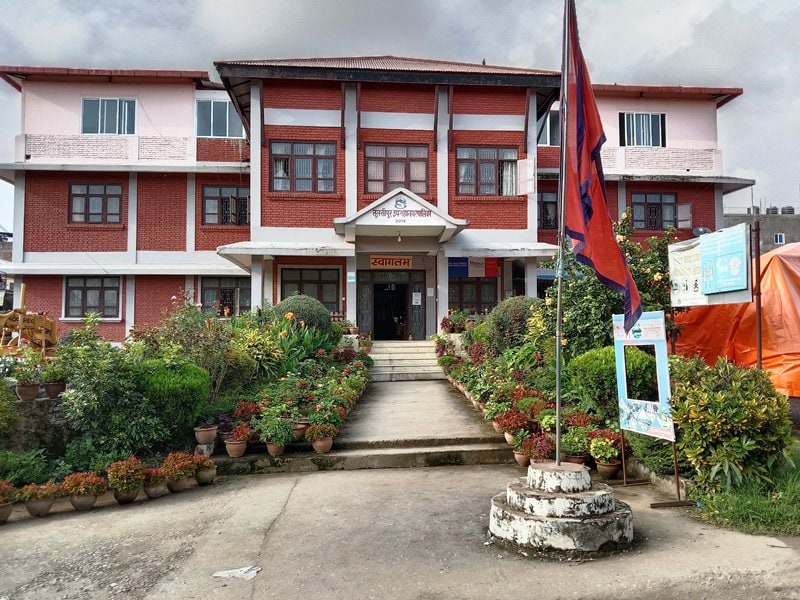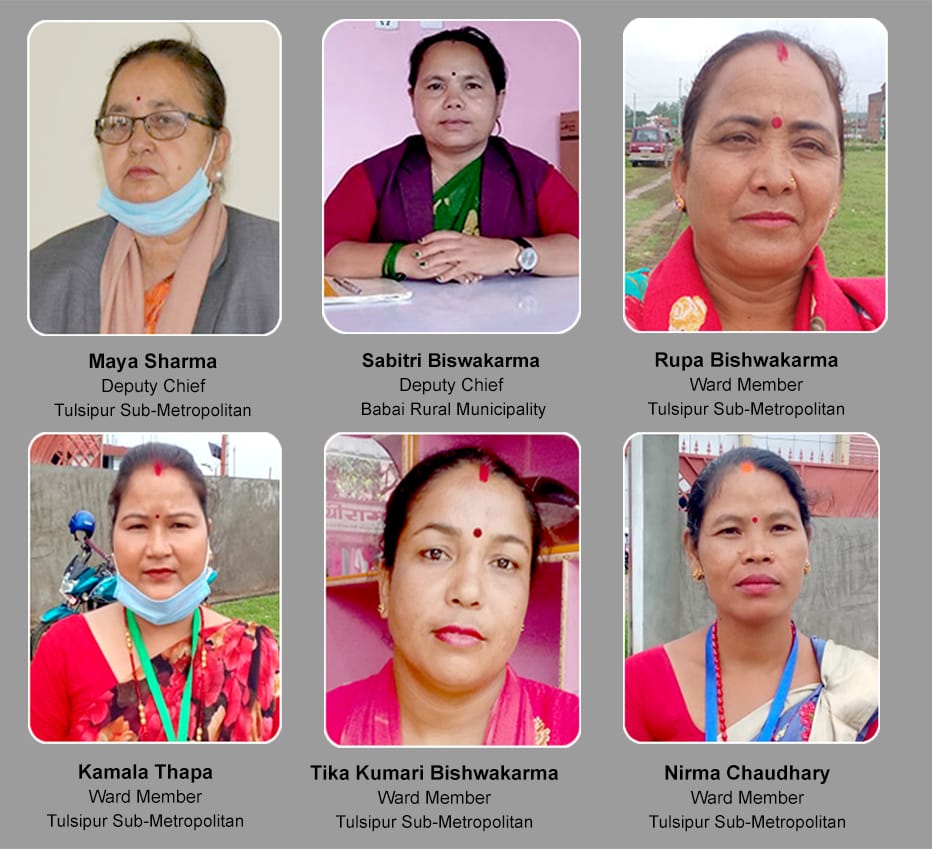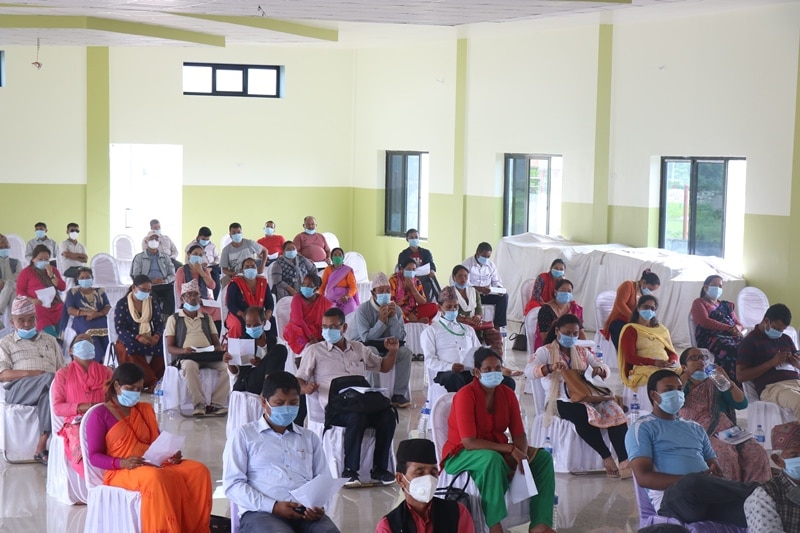Elected women representatives do not have access to policy-making. This highlights the plight of elected women and Dalit people’s representatives at the local level across the country.
Anjana Chaudhary: Centre for Investigative Journalism
Sabitri Biswakarma, deputy chairperson of Dang district’s Babai Rural Municipality, did not get to participate in the annual policy, program and budgeting process except in the first year. For the past two years, the deputy chairperson has felt being sidelined in the budgeting process. Naturally, her concerns could not be addressed in the budgeting. “I didn’t face any problem in the first year. But I’ve been left in the dark for the past two years,” Biswakarma said.

photos: Anjana Chaudhary
When asking for votes during the local elections, Biswakarma had promised to build new homes for impoverished Dalits, minorities, persons with disabilities and targeted groups. Had she been included in the budgeting process, she would have ensured including those promises in the policy and program.
When she was sidelined from the policy and program and budgeting process, she spoke to Bhuwaneshwar Paudel, the chairperson of the rural municipality. It was only after that that her demands were included in the budget for the fiscal year. “I had a hard time including programs aimed at the welfare of everyone and not only of the targeted groups. Some of my demands have been addressed this year.”
Sabitri had in the fiscal year 2017/18 proposed to build a rural municipality-level Dalit museum to conserve the skills, art and culture of the Dalit community. But her proposal got no takers in the beginning. “I was told that there was no space available to build a museum. I was also told that such a museum should not be built at all,” Biswakarma said.
When Sabitri stood firm on her demand, the Babai Municipality-3 started building a Dalit museum last fiscal year. “We had been planning to build a museum in Hamasapur. Albeit late, we have now started building a Dalit museum on the land protected by the rural municipality,” said Paudel, the chairperson.
The constitution has given the responsibility of the coordinator of the judicial committee to the deputy chairperson of the local government. However, Sabitri believes some people have discriminated against her and caused violence on her by questioning her work towards her execution of judicial work due to her caste affiliation. “When I settle social problems, I am humiliated. ‘Why to attend the meetings convened by a Kamini?’ people say. This is violence against is on the basis of my caste.”
In the fiscal year 2019/20 BS, there were 66 cases in the judicial committee of Babai Rural Municipality. Sabitri settled 44 of the cases. According to her, 18 cases were related to physical and verbal harassments, 12 related to water canal and irrigation, two related to wage fraud, two related to forgery, six related to family dispute, 12 related to land boundaries, two related to property misuse, two related to denial of ward recommendation hindering, five related to in parenting and relationship verification, one related to financial transaction, three related to property share dispute and one related to rent.
Discrimination against women people’s representatives is not limited to just one issue. In some rural municipalities, the deputy chairpersons have been left without a role. For example, Shanti Chaudhary, the deputy chairperson of Gadhwa Rural Municipality of Dang, believes her role has been limited to just coming to the rural municipality in the morning and returning home in the past three years. “It’s been three years since I’ve been in the office all day and returned home in the evening,” Chaudhary said. According to Chaudhary, the rural municipality chairperson Sahajram Ahir hasn’t discussed with her on any decision and work of the rural municipality.
 Chaudhary presented a budget of Rs478.3 in the fiscal year 2019/20 in the rural municipality assembly. However, the red book of the rural municipality showed a budget of 569.7 million, which was more than what the rural municipality assembly had passed. Chaudhary said the rural municipality did not inform her when it published more budget than what was passed by the assembly. In her absence, rural municipality chairperson Sahajram Ahir and ward chairpersons jointly distributed projects worth Rs.50 million on August 11, 2019. After Chaudhary protested, Ahir proposed that Chaudhary make a plan of spending Rs10 on her own. “I didn’t accept the offer,” said Chaudhary.
Chaudhary presented a budget of Rs478.3 in the fiscal year 2019/20 in the rural municipality assembly. However, the red book of the rural municipality showed a budget of 569.7 million, which was more than what the rural municipality assembly had passed. Chaudhary said the rural municipality did not inform her when it published more budget than what was passed by the assembly. In her absence, rural municipality chairperson Sahajram Ahir and ward chairpersons jointly distributed projects worth Rs.50 million on August 11, 2019. After Chaudhary protested, Ahir proposed that Chaudhary make a plan of spending Rs10 on her own. “I didn’t accept the offer,” said Chaudhary.
Sub-section (4) (b) of section (16) of the Local Government Operation Act states that in the absence of the rural municipality, his or her responsibility is delegated to the deputy chairperson. However, Chaudhary has not been able to exercise her right yet. “I haven’t got that responsibility in three years,” said Chaudhary.
On his part, chairperson Sahajram stated that no acting official had been appointed till now. “In September-October, 2019, I was admitted at the hospital due to illness, I did not delegate the responsibility of the acting chairperson to anyone in the rural municipality. The deputy chairperson naturally becomes the acting chairperson in the absence of the chairperson. The deputy chairperson signed it off work that was to be executed in my absence,” he said.
The trouble suffered by local level Dalit and women ward members is similar. Tika Kumari Bishwakarma is a ward member of Dang’s Tulsipur Sub-Metropolitan City-12. After she was elected, the ward citizens along with the Dalits and the backward communities were thrilled. After being elected, she decided to work for the upliftment of Dalits, indigenous and socio-economically backward communities.
However, even after three years, she has not been able to fulfill her electoral promises. Tika has spent the last three years attending town and ward meetings. She said, “After I was elected as the ward member, the ward chairperson, upper-level people’s representatives and political parties did not want to listen. I couldn’t work as expected. Our roles are limited to assenting to the decisions made by others.”
Let’s look at an example: In the fiscal year 2019/20, the sub-metropolitan city had allocated Rs1 lakh for providing soap production training to Dalits. Although Tika was assigned as the coordinator of the program, all she was asked to do during the entire program was sign papers. All work was done by the ward staff. There were 25 participants from Dalit and impoverished families in the training held in the month of April-May of that fiscal year. “If they don’t allow us to operate the budget of Dalits and the poor, what else will they give?” asked Tika Kumari. She said that as long as there is discrimination in the treatment of people’s women representatives, the representation of Dalits and women will just be limited to token representation.”
Tulsipur Sub-Metropolitan City-12 ward chairperson Surya Bahadur Dangi said as the program coordinator and people’s representatives did not have the right to spend the money, the money was mobilized in the ward through the staff. Dangi said, “Only the people’s representatives are given the right to observe whether the program is successful or not. But the staff have the right to operate and spend the budget.”
The hardships faced by the ward member Nirma Chaudhary of Tulsipur Sub-Metropolitan City-11 in the last three years is similar to that of Tika Kumari. Her demand for the allocation of budget for the development of targeted groups in the ward and the city wasn’t heard. “Even though we have been continuously demanding a budget for the development of the targeted group for three years, no hearing has taken place,” Nirma said.

Meeting at Tulsipur Sub-Metropolitan City.
Ward-11 of the sub-metropolitan city organised a hosiery training for targeted groups from April 19 to June 8, 2018, with a budget of Rs3.75 lakh provided by the town and the ward. But the budget was inadequate. Nirma requested for an additional budget from the team including deputy chief of Tulsipur Maya Sharma who had visited to monitor the training. But Sharma ignored Nirma’s appeal. “Skill-based training could not be conducted due to lack of budget. No matter how much we requested, no additional budget was provided,” Nirma said.
Token representations seem to have upset women representatives. Rupa Bishwakarma, a ward member of Tulsipur Sub-Metropolitan City-17 said, “Ward chairpersons already pass the budget in the sub-metropolitan city. We can only applaud at the budget they have passed. We are just the witnesses of the shore.”
Women ward members usually have no idea about the budget before it is publicised. For instance, Tulsipur Sub-Metropolitan City passed the policy, program and budget for the current fiscal year 2020/21 on June 24, 2020. But many women ward members, including Rupa, only found out about the budget during the meeting. “We had asked the Municipal Council on August 28, 2017, to provide the budget to all people’s representatives two or three days in advance. But it has fallen on deaf ears. How can our issues be included in the policy program when it is only made public in the municipality’s executive meeting?”
Tulsipur Sub-Metropolitan City chairperson Ghanshyam Pandey said that it was not possible to call all the people’s representatives of the city to the executive meeting but the budget presented in the Municipal Council is sent to the ward by email before two or three days. Pandey says, “Ward secretaries probably give to those who come to ask. We don’t know about it.”
Kamala Thapa, a member of Tulsipur Sub-Metropolitan City-2, said she has not been able to take the demands of the people to the meeting even after three years. Kamala says, “Three years ago in the Municipal Council, my friends and I had requested the chairperson and deputy chairperson to involve the ward members in the executive meeting once a year, but that didn’t materialise,” Thapa said. However, deputy chairperson Pandey said, “We could not get the ward members to participate in the meeting of the executive meeting as the constitution itself does not have such a provision.”
There is a legal provision that one woman should be appointed as the chairperson or deputy chairperson at the local level, and one woman and one Dalit woman member must be elected in each ward. However, the fact that elected women representatives do not have access to policy-making shows the plight of elected women and Dalit people’s representatives at the local level across the country.



